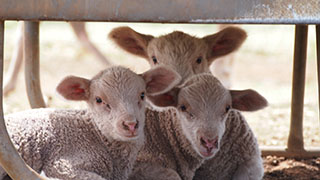Prof. Michael Reichel (Chair Professor of Veterinary Medicine and Dean of the College of Veterinary Medicine and Life Sciences) and researchers from the School of Animal and Veterinary Sciences, University of Adelaide, Australia, have investigated the clinical, haematological and reproductive responses in pregnant ewes infected with the predominant Australian Bovine Viral Diarrhoea Virus (BVDV) strain, BVDV-1c.


Photo credit: Dr. Caitlin Evans, School of Animal and Veterinary Sciences, University of Adelaide, Australia
The study suggested that acute BVDV-1c infections in sheep are clinically inapparent, unless infection occurs in a pregnant flock, where severe reproductive losses can be seen at lambing. To eliminate the reproductive losses associated with BVDV infection close contact between sheep and cattle, of unknown BVDV status, should be avoided during the joining and pregnancy periods.
The paper titled “Clinical responses and reproductive outcomes in pregnant ewes experimentally infected with bovine viral diarrhoea virus (Type 1-c) between days 59 and 69 of gestation” was accepted by the Small Ruminant Research journal in January 2017 (DOI: 10.1016/j.smallrumres.2017.01.012).
